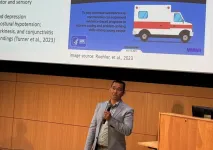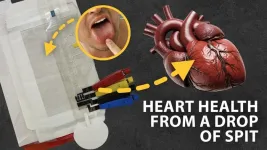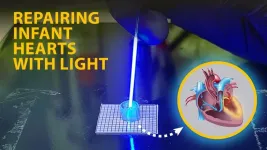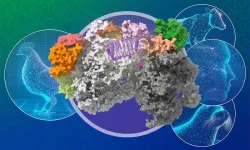(Press-News.org) SAN ANTONIO — August 19, 2024 —Southwest Research Institute (SwRI) has developed a unique technology to screen new DNA-targeting therapeutics designed to treat cancer and other diseases. Combining SwRI’s 3D drug screening software tool and machine learning techniques, SwRI scientists successfully predicted the DNA binding affinity and cancer cell toxicity for a variety of relevant drug compounds under development.
SwRI expanded the capabilities of its Rhodium™ drug development tool to visualize and rapidly predict how DNA-targeting therapeutics can attack cancer cells as well other diseases. According to the World Health Organization, cancer is a leading cause of death worldwide, responsible for one in six deaths globally. Chemotherapy uses a combination of drugs to slow or stop the growth and spread of cancer cells and shrink tumors. Many of these chemotherapeutics directly target DNA, which can damage the DNA in healthy cells and cause severe side effects, medical complications and even secondary cancers. While a number of drug development platforms and machine learning methods virtually screen drugs that target proteins, few methods exist for screening drugs that target DNA. SwRI has now successfully demonstrated a virtual screening application to design more effective DNA-targeting therapeutics to combat different types of cancer and infectious diseases.
“Cancer cells often have damaged DNA repair machinery and replicate much faster than healthy cells, which makes DNA a viable target for selective cancer treatment,” said Dr. Tristan Adamson, a research scientist in SwRI’s Pharmaceutical and Bioengineering Department. “SwRI has successfully developed and validated a powerful technique to use Rhodium™ for drug development campaigns that directly target DNA in oncology research for leukemia, breast cancer, liver cancer and more.”
Dillon Cao, an SwRI scientist working with Adamson, added, “We want to make drug compounds more selective to target a patient’s DNA for maximum efficacy while at the same time enabling scientists to prune away some of the drug toxicities.”
In an internally funded research project, SwRI scientists developed several machine learning training sets, each serving important roles in screening potential DNA-targeting oncology drugs. These models have been validated using statistical tests and correlated with published experimental data. SwRI scientists accurately predicted the effectiveness of drug compounds against several cancer cell models using the training sets and SwRI’s Rhodium™ virtual screening tool. They now plan to apply this software in future drug development programs to design next-generation cancer therapeutics.
SwRI used internal funding to develop Rhodium™ software to provide a computer-aided tool to rapidly screen possible treatment methods to combat infectious diseases and chemical warfare agents. SwRI’s machine learning capabilities can evaluate more than 2 million drug compounds in just a few days to identify compounds with high probability for successful treatment with minimal adverse side effects. SwRI has used Rhodium™ to successfully identify highly potent therapeutics for several infectious diseases, such as SARS-CoV-2 (commonly referred to as COVID-19) and hemorrhagic fevers, as well as chemical nerve agent antidotes.
SwRI has more than 75 years of pharmaceutical research and development experience including virtual drug design, medicinal chemistry, formulation, microencapsulation, process development and synthesis scale-up. SwRI’s Chemistry and Chemical Engineering Division is ISO 9001:2015 certified, meeting international quality standards for product development from initial design through Current Good Manufacturing Practice (CGMP) scale up and clinical supplies. SwRI scientists support drug development from discovery to clinical trials in FDA-inspected CGMP facilities.
For more information, visit https://www.swri.org/industries/pharmaceutical-development.
END
SwRI develops novel DNA-targeting therapeutic screening technique
Advanced application efficiently assesses new treatment possibilities, particularly for cancer
2024-08-19
ELSE PRESS RELEASES FROM THIS DATE:
Swiping through online videos increases boredom, study finds
2024-08-19
Swiping through online videos to relieve boredom may actually make people more bored and less satisfied or engaged with the content, according to research published by the American Psychological Association.
The study included seven experiments with a total of more than 1,200 participants from the United States or college students at the University of Toronto. In two baseline experiments, participants switched from one online video to the next when they were bored, and they predicted they would feel less bored by switching videos instead ...
Kelvin K. Droegemeier on ‘Working Toward a Computational Framework to Support Earth System Science and Climate Projection’
2024-08-19
Editor’s note: NCSA is cohosting an International Summit on a Computational System for Frontier Earth System Science and Climate Simulation & Projection September 29 through October 2, 2024 at the University of Illinois Urbana-Champaign.
Toward a Computational Framework for Earth System Models at Kilometer Resolution to Support Earth System Science and Climate Projection
By Kelvin K. Droegemeier, Professor of Atmospheric Science and Special Advisor to the Chancellor for Science and Policy at the University of Illinois Urbana-Champaign
Almost daily, and often without realizing it, we rely upon computers to guide our decisions. Whether finding the fastest ...
National Academy of Medicine selects FAU for substance use, opioid crises collaborative
2024-08-19
As of 2024, approximately 2.7 million Americans aged 12 and older were estimated to have misused prescription opioids in the past year. Moreover, alcohol, cannabis, cocaine, methamphetamines, among other substances, reflect a complex landscape that requires ongoing efforts aimed at prevention, treatment and policy changes to address the various issues associated with each substance.
Florida Atlantic University was recently selected to participate in the National Academy of Medicine’s (NAM) Action Collaborative on Combatting Substance Use Opioid Crises Core Competency Implementation Pilot Project. To improve coordination ...
Study finds potential link between DNA markers and aging process
2024-08-19
Researchers at Weill Cornell Medicine and the epigenetics company TruDiagnostic have uncovered DNA markers associated with retroelements, remnants of ancient viral genetic material, in our genes that act as highly accurate epigenetic clocks predicting chronological age. The results support the idea that certain retroelements in the human genome may be involved in aging.
Retroelements have been known to impact gene regulation, gene expression, genomic stability and the trajectory of various human diseases, but their potential as biomarkers for aging had been largely unexplored.
The ...
Improving access to heart-failure screening with saliva
2024-08-19
DENVER, Aug. 19, 2024 — Heart failure is a leading cause of death worldwide and is especially fatal for people who don’t have access to medical facilities. So, a team of researchers aims to bring heart failure screening from the lab to the home. Their point-of-care electrochemical biosensor prototype, which resembles a see-through lateral flow test for COVID-19, can measure levels of two biomarkers for heart failure in as little as 15 minutes from just a drop of saliva.
Trey Pittman, a graduate student at Colorado State University, will present his team’s research at the fall meeting of the American Chemical Society (ACS). ACS Fall 2024 is a hybrid ...
Expanding a child’s heart implant with light
2024-08-19
DENVER, Aug. 19, 2024 — Children born with defects that impair the heart’s lower chambers undergo a series of invasive surgeries early in life. The first surgery includes implantation of a plastic tube called a shunt to improve blood flow. However, as children grow, the shunt is often replaced to accommodate their changing bodies. Now, researchers have designed a shunt that expands when activated by light. If developed successfully, this device could reduce the number of open-chest surgeries these children receive.
The researchers will present their results at the fall meeting of the American Chemical Society (ACS). ACS Fall 2024 ...
New insights on how bird flu crosses the species barrier
2024-08-19
In recent years, public health measures, surveillance, and vaccination have helped bring about significant progress in reducing the impact of seasonal flu epidemics, caused by human influenza viruses A and B. However, a possible outbreak of avian influenza A (commonly known as ‘bird flu’) in mammals, including humans, poses a significant threat to public health.
The Cusack group at EMBL Grenoble studies the replication process of influenza viruses. A new study from this group sheds light on the different mutations that the avian influenza virus can undergo to be able to replicate in mammalian cells.
Some avian influenza ...
Energy companies pressure landowners into fracking, study shows
2024-08-19
BINGHAMTON, N.Y. -- Energy companies use persistent and personalized pressure to get landowners to give permission for hydraulic fracturing (fracking), and even when landowners decline, companies use legalized compulsion to conduct fracking anyway, according to a new study led by researchers at Binghamton University, State University of New York and UNLV.
“Hydraulic fracturing is a controversial issue, but a lot of the controversy has been focused on the big-picture consequences, for the climate and the economy,” said Benjamin Farrer, lead author and former PhD student at Binghamton University. “One of our hopes for this paper is that it will encourage policymakers ...
UC Irvine team says urban street networks, building density shape severity of floods
2024-08-19
Irvine, Calif., Aug. 19, 2024 — Cities around the globe are experiencing increased flooding due to the compounding effects of stronger storms in a warming climate and urban growth. New research from the University of California, Irvine suggests that urban form, specifically the building density and street network of a neighborhood, is also affecting the intensity of flooding.
For a paper published today in Nature Communications, researchers in UC Irvine’s Department of Civil and Environmental Engineering turned to statistical mechanics ...
Nurses play key role in addressing mental well-being for people after a stroke
2024-08-19
Statement Highlights:
The latest research indicates that 16% to 85% of people recovering from a stroke experience at least one psychosocial symptom, including depression, anxiety, stress, fatigue and/or decreased quality of life.
Critical nursing interventions, such as regular mental health screenings, education, symptom management and follow-up care, are key to reducing the negative effects on a patient’s mental well-being after a stroke, yet only a small proportion of patients receive treatment. ...
LAST 30 PRESS RELEASES:
Tiny bubbles, big breakthrough: Cracking cancer’s “fortress”
A biological material that becomes stronger when wet could replace plastics
Glacial feast: Seals caught closer to glaciers had fuller stomachs
Get the picture? High-tech, low-cost lens focuses on global consumer markets
Antimicrobial resistance in foodborne bacteria remains a public health concern in Europe
Safer batteries for storing energy at massive scale
How can you rescue a “kidnapped” robot? A new AI system helps the robot regain its sense of location in dynamic, ever-changing environments
Brainwaves of mothers and children synchronize when playing together – even in an acquired language
A holiday to better recovery
Cal Poly’s fifth Climate Solutions Now conference to take place Feb. 23-27
Mask-wearing during COVID-19 linked to reduced air pollution–triggered heart attack risk in Japan
Achieving cross-coupling reactions of fatty amide reduction radicals via iridium-photorelay catalysis and other strategies
Shorter may be sweeter: Study finds 15-second health ads can curb junk food cravings
Family relationships identified in Stone Age graves on Gotland
Effectiveness of exercise to ease osteoarthritis symptoms likely minimal and transient
Cost of copper must rise double to meet basic copper needs
A gel for wounds that won’t heal
Iron, carbon, and the art of toxic cleanup
Organic soil amendments work together to help sandy soils hold water longer, study finds
Hidden carbon in mangrove soils may play a larger role in climate regulation than previously thought
Weight-loss wonder pills prompt scrutiny of key ingredient
Nonprofit leader Diane Dodge to receive 2026 Penn Nursing Renfield Foundation Award for Global Women’s Health
Maternal smoking during pregnancy may be linked to higher blood pressure in children, NIH study finds
New Lund model aims to shorten the path to life-saving cell and gene therapies
Researchers create ultra-stretchable, liquid-repellent materials via laser ablation
Combining AI with OCT shows potential for detecting lipid-rich plaques in coronary arteries
SeaCast revolutionizes Mediterranean Sea forecasting with AI-powered speed and accuracy
JMIR Publications’ JMIR Bioinformatics and Biotechnology invites submissions on Bridging Data, AI, and Innovation to Transform Health
Honey bees navigate more precisely than previously thought
Air pollution may directly contribute to Alzheimer’s disease
[Press-News.org] SwRI develops novel DNA-targeting therapeutic screening techniqueAdvanced application efficiently assesses new treatment possibilities, particularly for cancer






